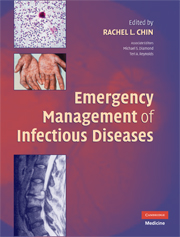Book contents
- Frontmatter
- Contents
- Preface
- Contributors
- Part I Systems
- 1 Infective Endocarditis
- 2 Myocarditis and Pericarditis
- 3 Dental and Odontogenic Infections
- 4 Systemic Diseases Causing Fever and Rash
- 5 Otitis Media
- 6 Otitis Externa
- 7 Sinusitis
- 8 Supraglottitis
- 9 Pharyngitis and Tonsillitis
- 10 Deep Neck Space Infections
- 11 Mumps
- 12 Peritonitis
- 13 Viral Hepatitis
- 14 Infectious Biliary Diseases: Cholecystitis and Cholangitis
- 15 Acute Infectious Diarrhea
- 16 Diarrhea in HIV-Infected Patients
- 17 Ulcerative Sexually Transmitted Diseases
- 18 Nonulcerative Sexually Transmitted Diseases
- 19 Vulvovaginitis
- 20 Male Genitourinary Infections
- 21 Adult Septic Arthritis
- 22 Hand Infections: Fight Bite, Purulent Tenosynovitis, Felon, and Paronychia
- 23 Osteomyelitis
- 24 Open Fractures
- 25 Spinal Infections
- 26 Prosthetic Joint Infections
- 27 Diabetic Foot Infections
- 28 Plantar Puncture Wounds
- 29 Periocular Infections
- 30 Conjunctival and Corneal Infections
- 31 Uvea, Vitreous, and Retina Infections
- 32 Community-Acquired Pneumonia
- 33 Tuberculosis
- 34 Influenza
- 35 HIV-Associated Respiratory Infections
- 36 Arthritis in the Acute Care Setting
- 37 Lower Urinary Tract Infection in Adults
- 38 Pyelonephritis in Adults
- 39 Fever and Headache: Meningitis and Encephalitis
- 40 Fever and Focal Cerebral Dysfunction
- 41 Fever and Acute Weakness Localizing to the Spinal Cord
- 42 Altered Mental Status in HIV-Infected Patients
- 43 Bacterial Skin and Soft-Tissue Infections
- Part II Pediatrics
- Part III Special Populations
- Part IV Current Topics
- Part V Overview of Antibiotics
- Part VI Microbiology/Laboratory Tests
- Part VII Infection Control Precautions
- Index
- References
8 - Supraglottitis
from Part I - Systems
Published online by Cambridge University Press: 15 December 2009
- Frontmatter
- Contents
- Preface
- Contributors
- Part I Systems
- 1 Infective Endocarditis
- 2 Myocarditis and Pericarditis
- 3 Dental and Odontogenic Infections
- 4 Systemic Diseases Causing Fever and Rash
- 5 Otitis Media
- 6 Otitis Externa
- 7 Sinusitis
- 8 Supraglottitis
- 9 Pharyngitis and Tonsillitis
- 10 Deep Neck Space Infections
- 11 Mumps
- 12 Peritonitis
- 13 Viral Hepatitis
- 14 Infectious Biliary Diseases: Cholecystitis and Cholangitis
- 15 Acute Infectious Diarrhea
- 16 Diarrhea in HIV-Infected Patients
- 17 Ulcerative Sexually Transmitted Diseases
- 18 Nonulcerative Sexually Transmitted Diseases
- 19 Vulvovaginitis
- 20 Male Genitourinary Infections
- 21 Adult Septic Arthritis
- 22 Hand Infections: Fight Bite, Purulent Tenosynovitis, Felon, and Paronychia
- 23 Osteomyelitis
- 24 Open Fractures
- 25 Spinal Infections
- 26 Prosthetic Joint Infections
- 27 Diabetic Foot Infections
- 28 Plantar Puncture Wounds
- 29 Periocular Infections
- 30 Conjunctival and Corneal Infections
- 31 Uvea, Vitreous, and Retina Infections
- 32 Community-Acquired Pneumonia
- 33 Tuberculosis
- 34 Influenza
- 35 HIV-Associated Respiratory Infections
- 36 Arthritis in the Acute Care Setting
- 37 Lower Urinary Tract Infection in Adults
- 38 Pyelonephritis in Adults
- 39 Fever and Headache: Meningitis and Encephalitis
- 40 Fever and Focal Cerebral Dysfunction
- 41 Fever and Acute Weakness Localizing to the Spinal Cord
- 42 Altered Mental Status in HIV-Infected Patients
- 43 Bacterial Skin and Soft-Tissue Infections
- Part II Pediatrics
- Part III Special Populations
- Part IV Current Topics
- Part V Overview of Antibiotics
- Part VI Microbiology/Laboratory Tests
- Part VII Infection Control Precautions
- Index
- References
Summary
INTRODUCTION – AGENTS
Patients with supraglottitis may present to the acute care setting with complaints of a sore throat and difficulty breathing. These symptoms may reflect a self-limited upper respiratory infection (URI) or, infrequently, an impending airway emergency.
Supraglottitis describes inflammation of the supraglottic structures, which include the epiglottis, the false vocal cords and arytenoids, and the aryepiglottic folds. In the past these infections were all called epiglottitis, but supraglottitis is a more anatomically accurate description as the surrounding supraglottic structures are usually involved. The vallecula and tongue base, technically part of the oropharynx, may also be affected.
Haemophilus influenzae was previously the primary organism responsible for epiglottitis/supraglottitis. With the advent of the H. influenzae type B (HIB) vaccine and its widespread use, the overall incidence of supraglottitis and H. influenza as a causative organism has decreased significantly. Other causative etiologies include Streptococcus pneumoniae, Streptococcus pyogenes Staphylococcus species, and other Haemophilus species, such as Haemophilus parainfluenzae. Less commonly involved are bacteria such as Klebsiella or Pseudomonas, viruses, or Candida.
EPIDEMIOLOGY
In the past, young children made up the majority of cases of epiglottitis (see Chapter 49, Pediatric Respiratory Infections). With widespread HIB vaccination of the pediatric population, however, the disease is now more common in adults than children in the United States.
- Type
- Chapter
- Information
- Emergency Management of Infectious Diseases , pp. 43 - 44Publisher: Cambridge University PressPrint publication year: 2008

